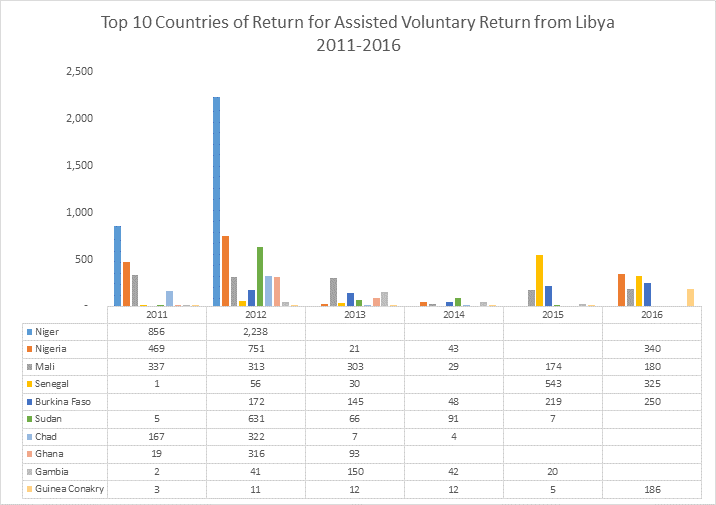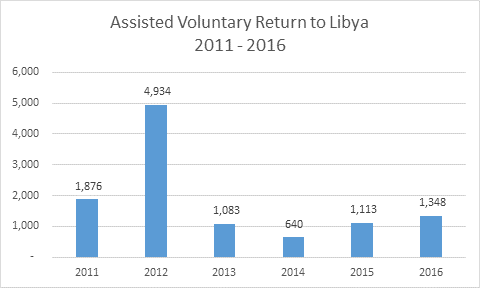-
Who we are
WHO WE AREThe International Organization for Migration (IOM) is part of the United Nations System as the leading inter-governmental organization promoting since 1951 humane and orderly migration for the benefit of all, with 175 member states and a presence in 171 countries.
-
Our Work
Our WorkAs the leading inter-governmental organization promoting since 1951 humane and orderly migration, IOM plays a key role to support the achievement of the 2030 Agenda through different areas of intervention that connect both humanitarian assistance and sustainable development.
What We Do
What We Do
Partnerships
Partnerships
- Where we work
-
Take Action
Take Action
Work with us
Work with us
Get involved
Get involved
- Data and Research
- 2030 Agenda
Assisted Voluntary Returns of Migrants from Libya Approach 11,000
Libya - With the voluntary return of 241 Nigerian nationals from detention in Libya this week (23/8), IOM has now repatriated nearly 11,000 migrants from Libya to their countries of origin since the overthrow of the Gaddafi regime in 2011.
The Nigerians included 174 men and 67 women, and included several teenagers. This brings the total number of 581 Nigerians returned from Libya in 2016 to 581. Since the onset of the Libyan crisis in 2011, some 1,624 Nigerians have returned home from Libya with IOM.
This compares with some 3,000 migrants returned from Libya to Niger – a country which shares a land border with Libya. IOM charters have also repatriated migrants from Libya to Senegal, Mali, Burkina Faso, Guinea-Conakry, Ghana, Sudan and The Gambia.
“The humanitarian repatriation programme ensures humane, dignified and safe return for stranded migrants back to their home countries,” said IOM Libya Chief of Mission Othman Belbeisi. “This is the third return flight to Nigeria since the beginning of 2016. Our office in Nigeria is providing reintegration assistance to the most vulnerable of these returnees,” he added.
Emmanuela, the mother of a 3-year-old boy, told IOM that she had been working in Libya as a housemaid, while her husband took care of their son in Nigeria. She was affected by Libya’s deteriorating economy and political turmoil.
“I was working for very little money and in some cases, I didn't receive any. It was difficult to save because of lack of income and high prices. I had no money to return home until the Nigerian Church put me in touch with IOM. Now I will be able to be with my son when he starts school.”
Alhaji, 22, had an even worse experience. “I came here in 2011 to work and maybe one day make enough to go to Europe. I was working as a barber when I was stopped by a group of men who wanted my phone and everything I had on me. They ended up shooting me and I was left there until a local man took me to a clinic.” Doctors had to remove one of his testicles and he now has to use a silicon tube to urinate.
Ellsa, 20, had nearly made it across the Mediterranean, but the boat in which she was travelling was intercepted by the Libyan Coastguard. “I paid 400,000 Nigerian Naira (USD 1,000) in Nigeria to get to Italy, but I never want to leave again. I never thought Libya would be worse than back home. I am happy to be going back,” she said.
Nigerians are among the top nationalities rescued from rubber dinghies and other small crafts in the Channel of Sicily by Italian and other vessels. IOM Rome reports that between January 1, 2015 and the end of July 2016 at least 40,824 Nigerians arrived in Italy after being rescued at sea. Almost all of them sailed from Libya.
Suliman Alabi, a consular assistant with the Nigerian embassy in Tripoli, says that without the IOM charters, many of the migrants would still be stranded in detention centres. He estimates that there may be as many as 6,000 undocumented Nigerian nationals still in detention centres or living in Libyan towns. “Although many are leaving, many continue to come,” he notes.
Before boarding the IOM charter flight to return home on Tuesday, each migrant was provided with a hygiene kit, underwear, a shirt, tracksuit and shoes. A mobile patrol from the Libyan Directorate of Combating Illegal Migration (DCIM) escorted the buses to Mitiga airport.
On arrival at Murtala Muhammed International Airport (MMIA), the returnees were met by IOM Nigeria staff. They were provided with post-arrival assistance and given cash grants to facilitate their onward transportation. The most vulnerable migrants – 18 percent of the group – will be given reintegration assistance by IOM Nigeria over the next six months.
The cost of the charter was covered by three IOM projects funded by the Swiss Secretariat of Migration, the UN Central Emergency Response Fund and the Kingdom of the Netherlands.
IOM has two more charters scheduled to leave Libya in early September – one to Niger and the other to Burkina Faso.


For further information, please contact IOM Libya. Othman Belbeisi, Tel +216 29 600389,
Email: obelbeisi@iom.int or Ashraf Hassan, ashassan@iom.int. Or Ikechukwu Hillarion Attah at IOM Abuja, Tel: +234 8036452973, Email: iattah@iom.int.